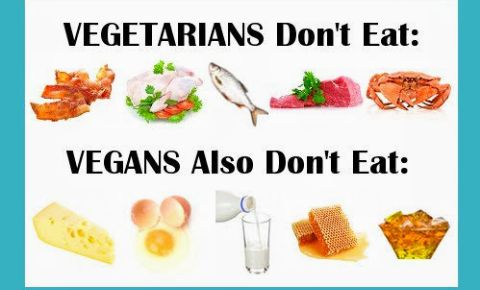People choose to be vegans or vegetarians because of health concerns, religious restrictions or moral concerns about harming animals.
The difference between going vegan versus vegetarian primarily centers on the role of animals in food production.
While both diets focus on eating more plant-based foods, vegetarians are allowed to include eggs, honey, and dairy. Vegans omit all animal foods or animal-sourced products, including meats, poultry, dairy, honey, and eggs.
This article takes a look at the similarities and differences between these two diets.
What Is a Vegetarian Diet?
The Vegetarian Society defines a vegetarian as a person who does not eat any meat, poultry, game, fish, shellfish or by-products of animal slaughter.
There are different types of vegetarians but a vegetarian diet contains various levels of fruits, vegetables, grains, pulses, nuts and seeds. The inclusion of dairy and eggs depends on the type of diet you follow. The different types of vegetarians are:
Lacto-ovo vegetarians: Vegetarians who avoid all animal flesh, but consume dairy and egg products.
Lacto vegetarians: Vegetarians who avoid animal flesh and eggs, but consume dairy products.
Ovo vegetarians: Vegetarians who avoid all animal products except eggs.
Vegans: Vegetarians who avoid all animal and animal-derived products.
What Is a Vegan Diet?
This can be considered the strictest form of vegetarianism as the Vegan Society as a way of living that attempts to exclude all forms of animal exploitation and cruelty as much as possible.
Vegans avoid the consumption of foods derived from animal flesh and by-products such as dairy, eggs and animal-derived ingredients. These include gelatin, honey, carmine, pepsin, shellac, albumin, whey, casein and some forms of vitamin D3.
Vegans choose to avoid all animal by-products because they believe that animals have a right to be free from human use, be it for food, clothing, science or entertainment.
Which Is Healthier?
According to a report from the Academy of Nutrition and Dietetics and several scientific reviews, both vegetarian and vegan diets can be considered appropriate for all stages of life, as long as the diet is well planned.
Vegetarians and vegans should strongly consider analyzing their daily nutrient intake, getting their blood nutrient levels checed and taking supplements accordingly.
The few studies directly comparing vegetarian to vegan diets report that vegans may have a somewhat lower risk of developing type 2 diabetes, heart disease and various types of cancer than vegetarians.
A vegan diet may be better than a vegetarian diet for controlling weight and reducing the risk of certain diseases. However, if not well planned, a vegan diet is also more likely to cause nutritional deficiencies.
The medical information provided in this article is provided as an information resource only. This information does not create any patient-physician relationship and should not be used as a substitute for professional diagnosis and treatment.





You could definitely see your expertise in the work you write. The world hopes for even more passionate writers like you who are not afraid to say how they believe. Always go after your heart.